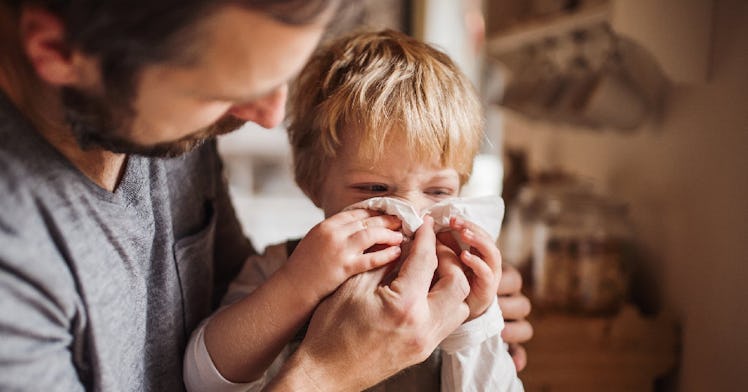It’s May, So Why Are Flu Levels Rising?
Flu season does technically run until the end of May, but it's unusual for cases to be rising this late like they are right now.

After two relatively mild flu seasons in the U.S., the 2021-2022 flu season isn’t giving up yet. Well into the time of year when flu cases have become almost nonexistent, numbers continue to rise in certain regions of the country, leaving people to wonder what in the world is happening with the flu.
The 2019-2020 and 2020-2021 flu seasons saw record low caseloads, primarily due to the fact that people were taking precautions like masking and social distancing to prevent COVID infection. This year, though, many people have relaxed their precautions, leaving the door wide open for influenza to make a rowdy comeback. Cases have remained relatively low so far compared to the most seasons, but at this late point in the season, flu numbers are, oddly enough, still rising. We expect cases of influenza to decrease as the weather warms and we move through spring and into summer, so what gives?
Flu Cases Are Increasing in the U.S.
Last week, the Centers for Disease Control and Prevention (CDC) reported an increase in flu-like infections in most U.S. states. New Mexico, Colorado, New York, and Massachusetts have some of the highest rates of transmission in the country.
So far this flu season, the U.S. has counted 5.3 million flu cases, 53,000 hospitalizations, and 3,200 influenza deaths. This includes 23 pediatrics deaths. The majority of flu cases were caused by Influenza A, H3N2 specifically. The first human case of the H5 Avian flu that has been making headlines in recent weeks was detected in the week ending April 23.
There is no one definitive answer as to why flu cases are still rolling in this late into spring, but flu season does technically last until the end of May. Some experts suggest that the reason cases are being drawn out until the end of the season this year is because of the relaxation of COVID mitigation practices like masking. Another theory holds that the H3N2 virus mutated after the flu vaccine was manufactured last year, decreasing the vaccine’s efficacy to only 16%.
However, even though flu cases are increasing and the flu season is lingering, current numbers are still far below pre-pandemic levels. From 2010 to 2020, the average number of flu cases per year were between 9 million and 41 million.
Are We More Susceptible to Illnesses After the Pandemic?
Many people are wondering whether we may have damaged our immune systems after two years of avoiding any respiratory illness like, well, the plague. Thankfully, that’s not how immunity works. Once you develop antibodies for a pathogen, your body will produce them as needed, even if you’ve been cut off from the world for two years.
The most commonly held theory as to why it seems like everyone seems to be sick with non-COVID illness is that, now that we’re back in the world, we’re being exposed to pathogens more often. The germs were always there, we were just avoiding them. Now that we’re not avoiding them anymore, we’re getting sick.
Do Parents Need to Worry About the Flu and Other Viruses?
When our immune systems encounter a pathogen — whether viral, bacterial, or fungal — they learn to recognize it and are able to fight it off the next time it’s encountered. Some worry that because children’s immune systems are still learning, the lack of exposure to pathogens during lockdown could cause problems with their immunity long term.
But don’t worry; you didn’t damage your child’s immune system by taking COVID precautions for the last two years. If anything, the development of children’s’ immune systems was placed on hold during lockdown, when they weren’t being exposed to pathogens in school or other in-person events. Now that restrictions are lifting and people are heading out in public again, those pathogens will be there, and children will be exposed. The cold they would have caught last year, they’ll catch this year, and their bodies will learn to fight it off for the future.
It’s similar to missing a day or two of school and having makeup work to do. You don’t fail the class because of the missed assignments, you just have to do the work later than you would have had to otherwise. In the end, your grade, and your immune system, will be the same as it would’ve been had the COVID-19 pandemic never reared its ugly head.